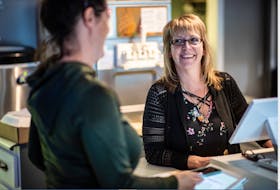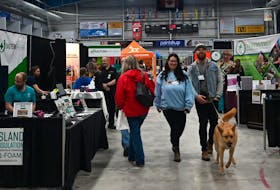The COVID-19 pandemic and its related stress has changed our lives, making it difficult for many Newfoundland and Labrador residents to get a good night’s rest.
Worried about health, work, families and finances, Kelda Newport says many people are turning to sleeping pills with the hopes of improving their sleep — and that could become dangerous.
“Sleeping pills don’t provide a lot of benefit — even at the best of times — but they can cause a lot of harm,” says Newport. “So we’re spreading the word that there are safer and more effective options than sleeping pills.”
Newport is the project coordinator for SaferMedsNL, which works to raise awareness around safe and effective medication use, thanks to a partnership with Memorial University of Newfoundland (MUN), the Canadian Deprescribing Network (CaDeN) and the provincial government.
SaferMedsNL encourages patients to talk regularly with their healthcare providers about the medications they’re taking — and to ask if they still need to be taking them — but Newport says right now there’s a specific concern surrounding sleeping pills, given the pandemic’s stress.
While the rest of Canada has noticed a decrease in people taking sleeping pills over the past couple of years, Newfoundland and Labrador has seen an increase. Newport says this is especially concerning for the older population, as one in four seniors in the province takes sleeping pills regularly.
When sleeping pills were first introduced in the 1960s, many prescribers believed they were the ultimate treatment for people who struggled with consistent, restful sleep. By the 1970s, sleeping pills were the most widely-prescribed medication in North America.
But Newport says new information about their safety has come to light in recent years, and many healthcare professionals are now cautioning their patients on the potential dangers of sleeping pills.
“Sleeping pills can cause memory and concentration problems, and they increase your risk of falls and fractures,” says Dr. Justin Turner, from the faculty of medicine at the University of Montreal and the Scientific Director of SaferMedsNL. “Driving the day after you take a sleeping pill puts you at the same risk of having a car crash as if you were to drive over the blood alcohol limit. It’s eye-opening for a lot of people.”

Dr. Turner says people sometimes cling to the idea that they won’t be able to sleep without their sleeping pills, but the reality is that their benefit wears off after only a few weeks of regular use — and they’re “not that good to begin with.”
“On average, they only help someone fall asleep 14 minutes faster and might give them about an extra 35 minutes of sleep,” adds Dr. Turner.
Dr. Debbie Kelly, an associate professor at MUN’s School of Pharmacy and director of the Medication Therapy Services (MTS) Clinic, is the project co-lead alongside Dr. Turner. Dr. Kelly says that when the risks of any medication outweigh the benefits, they become potentially harmful or inappropriate for that person.
Dr. Kelly says people are often prescribed sleeping pills because they’re having trouble falling (or staying) asleep, but the pills are meant to be a very short-term solution.
The trouble is that people may continue taking the pills long after they’ve stopped being effective, simply because the topic never came up again with their healthcare provider. That’s why she says it’s so important to regularly talk with your healthcare professional about which medications you’re taking.
People can become dependent on their sleeping pills and then experience withdrawal symptoms when they stop taking them suddenly, so it’s important they discuss any potential changes with their healthcare provider first. No one should stop taking any medication without first discussing with their pharmacist, physician or nurse practitioner, but we do want to see patients ask questions about the harms and benefits of their medication, and in this case, sleeping pills.
SaferMedsNL.ca includes free sleep resources, like a printable brochure you can bring to your healthcare provider to talk about how to safely stop taking sleeping pills and how to create an individualized plan to help you slowly reduce your dose.
Whether someone is working with their pharmacist, doctor, or nurse practitioner to reduce the dose of their sleeping pills or has never taken one in their life, Newport says they’re encouraging anyone struggling with sleep to check out SaferMedsNL.ca to learn more about the following safe and effective ways to improve sleep patterns ...
- Sleep therapy, like CBTi (Cognitive Behavioural Therapy for insomnia) helps you regain your natural sleep and can be learned on your own using online resources.
- Keeping a sleep diary helps you track the details that can identify what’s messing up your sleep, and it’s a useful tool to share with your healthcare professional.
- Stress management means finding out which techniques work best for you, like deep breathing, muscle relaxation or mental imagery.
- Regular exercise can improve your sleep, but make sure it’s not too close to your bedtime or it could have the opposite effect.
- Restrict device usage leading up to bedtime because the blue light can disrupt your natural sleep patterns.
- Have a dark and cool bedroom for an ideal night’s sleep, so consider black-out blinds or a temperature adjustment.
- Limiting caffeine, nicotine and alcohol can help you sleep better, and there are specific recommended “stop times” for all three.
To learn more about how to improve your sleep and find out how to talk to your pharmacist, doctor, or nurse about tapering off your sleeping pills, visit SaferMedsNL.ca.









